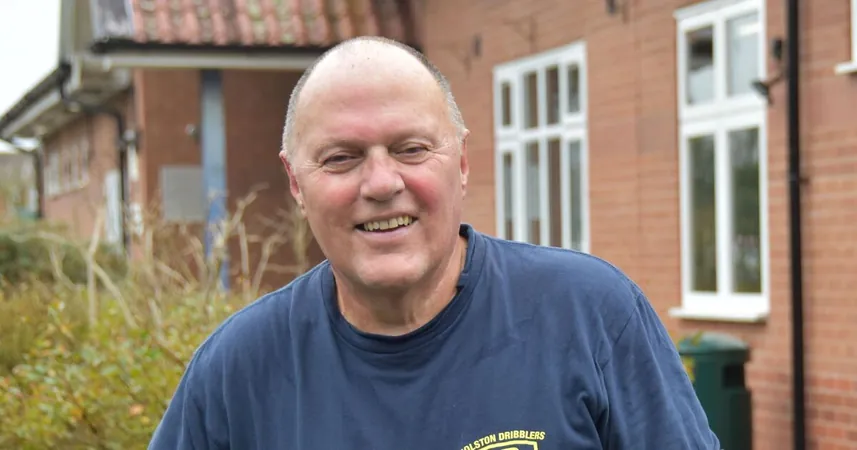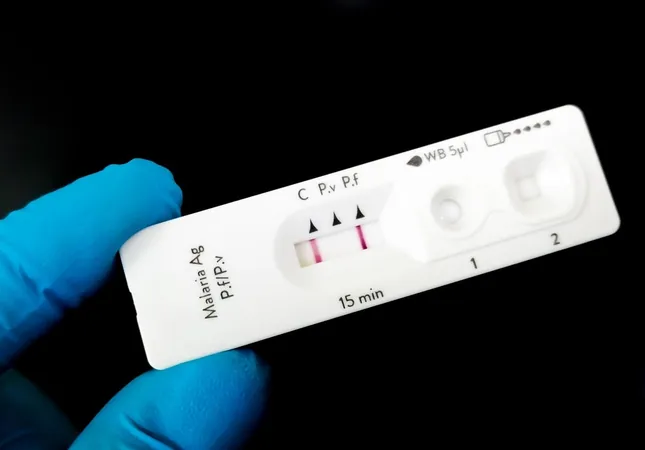
From Dizziness to Diagnosis: How One Man's Routine Check Revealed a Prostate Cancer Battle
2025-01-12
Author: John Tan
Introduction
Richard Bean, a 68-year-old retired resident of Coventry, was living what many would consider a perfect retirement: staying active with his grandchildren, cycling, and rediscovering his passion for football. Writing the story of his life, he had no inclination that a simple visit to his GP for dizziness would lead to a life-altering cancer diagnosis.
Initial Ignorance
"It’s all too easy for men to ignore signs and not think about conditions like prostate cancer," Richard reflects. With a close friend battling the disease for over 11 years, he believed he was in the clear. “I wasn’t experiencing typical symptoms—no frequent urination or discomfort. My friends even joked that I was ‘the camel’ because I rarely needed to go,” he shared.
Referral and Diagnosis
In September 2023, after experiencing persistent dizzy spells, Richard decided to consult his doctor. Initially diagnosed with vertigo, his doctor ordered blood tests. During a conversation about prostate health with his football buddies, Richard suggested a prostate-specific antigen (PSA) test 'almost as an afterthought,' not truly believing there would be a problem.
But the diagnosis came as a shock. “I was still in my hospital gown when they informed me I would need a biopsy. I thought, we haven’t even had the MRI results yet, but the doctor said, ‘We’re 97% sure you’ve got cancer.’” Facing this frightening revelation with his wife, Jan, Richard learned he had a Gleason score of nine out of ten, indicating an aggressive form of prostate cancer.
Treatment Decision
Fortunately for Richard, the cancer was localized. This allowed him to choose between a prostatectomy (removal of the prostate) or radiotherapy. Opting for the latter, he participated in a clinical trial that significantly compressed the treatment schedule from the typical 20 sessions to just five days. “I did three sessions in one week and two the following week. Thankfully, I didn’t feel any different, just a higher dose of radiation,” he explained.
Recovery and Ongoing Challenges
As a result of his treatment, Richard celebrated an undetectable PSA level shortly after, much to his relief. Following guidelines from his medical team, he has remained physically active to counteract potential side effects of his treatment; doing so not only aids in maintaining strength, but also allows him to keep enjoying football—a sport that brings him immense joy despite not being particularly skilled.
However, the hormone therapy he is undergoing has brought on menopausal symptoms that Richard candidly discusses. “I feel tired and emotional, with hot flashes that make me toss and turn at night. I tell Jan, ‘I’m having a moment!’” The therapy has also caused some weight gain, prompting Richard to joke about his struggle to fit back into his jeans after the summer.
Management Strategies
To manage the side effects effectively, Richard has incorporated pelvic floor exercises, utilizing the NHS Squeezy app to help with bladder control, committing to the regimen for six months. As of now, he is in a state of technical remission, dealing mostly with the psychological burden of routine blood tests that have him anxiously awaiting the results.
Reflections
"I still can’t believe this happened to me," he confides. "I’ve had no real pain; it’s really the treatment and side effects that have troubled me the most.”
Support System
His beloved football team has also been a strong support system during this challenging journey. "Every time I hit the pitch, someone checks in on me to see how I’m doing, and I’ve found that comforting,” he notes.
Awareness and Advocacy
Yet, the reality of cancer hits hard when he hears of others, like Olympic cyclist Chris Hoy, who face similar battles without any evident symptoms. "When I heard that news, I broke down. We hugged our grandchildren a little longer that day," he recalled.
Determined to foster a community of awareness, Richard took to social media to share his story, prompting 15 men to undergo tests, with one requiring further monitoring due to elevated levels. "This experience has made me realize how vulnerable we are. It's crucial for men to visit their doctors and take care of their health. You're not invincible."
Conclusion
Prostate Cancer UK continues to campaign for increased awareness about prostate health, emphasizing that many men are diagnosed at advanced stages of the disease, which makes early detection vital. Every story shared can inspire others to take their health seriously, just like Richard did—turning a routine visit into a transformative call to action.


 Brasil (PT)
Brasil (PT)
 Canada (EN)
Canada (EN)
 Chile (ES)
Chile (ES)
 Česko (CS)
Česko (CS)
 대한민국 (KO)
대한민국 (KO)
 España (ES)
España (ES)
 France (FR)
France (FR)
 Hong Kong (EN)
Hong Kong (EN)
 Italia (IT)
Italia (IT)
 日本 (JA)
日本 (JA)
 Magyarország (HU)
Magyarország (HU)
 Norge (NO)
Norge (NO)
 Polska (PL)
Polska (PL)
 Schweiz (DE)
Schweiz (DE)
 Singapore (EN)
Singapore (EN)
 Sverige (SV)
Sverige (SV)
 Suomi (FI)
Suomi (FI)
 Türkiye (TR)
Türkiye (TR)
 الإمارات العربية المتحدة (AR)
الإمارات العربية المتحدة (AR)